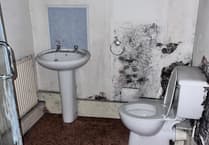The Hygiene Bank in Kingsbridge has seen a rise in demand for hygiene products like toothbrushes and toothpaste.
Jennifer Jebb, who co-ordinates the distribution of these products around the South Hams, explained how the gravity of the shortages inspired her to get involved with The Hygiene Bank during the early stages of its development, detailing the “desperate situation” in schools, with young girls not attending because they didn’t have the necessary sanitary products, and teachers buying hygiene products for students out of their own pocket. She explained that although lots of people donate to local foodbanks, they “don’t tend to give hygiene products”, which means that there is a worrying shortage of these crucial items.
A new report released by The Hygiene Bank, a charity that provides hygiene products to people nationwide, has revealed that there are over three million adults in the UK that have been impacted by hygiene poverty, and have been going without products like shampoo, soap, tampons and toothpaste for the last twelve months due to being unable to afford them. Jennifer explained that a lot of these people are disabled or vulnerable, and depend on the donations of hygiene products to go about their day-to-day lives hygienically.
Jennifer co-ordinates a lot of the local distribution operation herself, taking donations at her home and organising their dispersal to the places that need them most. During the early stages of The Hygiene Bank’s establishment, she began implementing donation boxes around Kingsbridge, the locations of which can be found on The Hygiene Bank’s website.
However, during the COVID-19 pandemic these collection boxes couldn’t be used because of cross-contamination, so local charities relied upon brand donations to the Hygiene Bank. Although they are now back in use, the shortage issue has worsened, and with of the factors amplifying this problem being the shame many feel when talking about hygiene poverty. Because of the personal nature of the products, people are hesitant to discuss their struggles.
Alan Dunne, a volunteer at Kingsbridge’s Hygiene Bank, said: “Food poverty itself is a subject that is taboo but hygiene poverty is seen as an even bigger taboo,” explaining that `’“Hygiene is a big part of poverty. If you haven’t got money, you haven’t got the means to buy soap, toothpaste, toothbrushes and tampons”, but “because it’s so personal, people don’t really want to talk about it.” Results from The Hygiene Bank’s research, which was published during National Hygiene Week last week to boost awareness of this issue, support this. Their findings show that 48% of people who cannot afford period products feel too embarrassed to ask for help, which highlights why it is so important for people to be talking about this issue to eliminate the rhetoric of shame that surrounds it.
The worrying figures also show that 49% of households experiencing hygiene poverty have gone without razors or shaving products, 42% of people have gone without laundry detergent or household cleaning products, and 61% of people say their mental health has been negatively impacted by hygiene poverty.
With the current cost of living crisis, there are worries that this problem could worsen even more, with the numbers of people struggling to stay clean without access to the toiletries they require increasing annually.
Alan Dunne, says charities are “overwhelmed” and labelled the issue a “crisis”. He said: “The cost of living crisis is going through the roof. We as a charity at Devon and Cornwall Food action have seen a massive rise in uptake of the people we’re supporting.”
If you would like to help by donating hygiene products, visit The Hygiene Bank website of contact Jennifer Jebb at [email protected].





Comments
This article has no comments yet. Be the first to leave a comment.